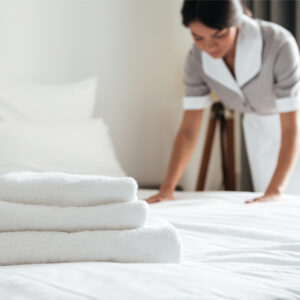Hotel Staff Panic Button for the City of Seattle: Hotel Employees Health and Safety
Many cities and states have passed hotel panic button legislation requiring that hotels equip employees with safety devices, the City of Seattle abides by guidelines to protect hotel employees from workplace injury or assault. Hotel employees are exposed to the risks associated with working alone in hotel rooms that may be occupied by guests. Therefore, panic buttons must be provided to all hotel employees who provide in-room services for hotels with 60 rooms or more. This applies to all employees, regardless of their position and panic button devices must be provided at no cost to the employee. Panic buttons must be easy to carry, employees must be able to call for immediate assistance and the devices must be functioning properly, and must not require continued activation by the employee. Equipping employees with panic buttons is the responsibility of the hotel employer. If an employee uses their panic button under appropriate circumstances, they may leave the scene and wait for help elsewhere. No employer retaliation may occur against the employee for acting in this manner.
Interested in Hotel Panic Buttons?
Date of Compliance
On November 30th, 2016, the Health and Safety (HEHS) Initiative became effective and requires Seattle hotels with 60 or more guest rooms to equip each staff member assigned to work alone in guestrooms with panic buttons. The Washington law is statewide and is applicable to all hospitality owners regardless of size.
Hotel Panic Buttons – What to look for:
Brand Approved:
Marriott International Hotels
Marriott International, plans to provide employees in the U.S. and Canada with safety devices/panic buttons, with the goal to fully install and integrate by 2020.
Hilton
Hilton has already implemented employee safety devices at numerous hotel locations and plan to deploy devices for all employees working in guestrooms at Hilton-managed properties in the U.S. by 2020. In addition, Hilton plans to include anti-harassment and anti-trafficking policies and training at all their properties.
Hyatt
Hyatt became one of the first hotel brands to issue safety devices to employee who work in guestrooms. This is a brand standard for Hyatt-managed full-service hotels in the U.S., and more than half of full-service franchise Hyatt hotels will implement safety devices to staff.
IHG
IHG has deployed safety devices to employees at numerous hotel locations within the U.S. and plan to fully implement safety devices at their managed hotels in the U.S. by 2020. As well as mandatory and enhanced workplace training for corporate and hotel employees in the U.S.
Wyndham Hotels & Resorts
Wyndham Hotels & Resorts plan to deploy employee safety devices to all employees in the U.S. who are assigned to work alone in guestrooms. These devices will be provided to the employee at no cost. Wyndham also plans to roll out mandatory, annual anti-sexual harassment, discrimination, and human trafficking training for all employees.
AccorHotels
Accor plans to equip employees who enter guestrooms and restrooms unaccompanied with safety devices by 2020. Accor also has a strict policy against sexual harassment and will also provide mandatory trainings to employees.
Best Western Hotels
Best Western branded hotels in the U.S. are required by the end of 2020 to provide employees with safety devices, at no cost to hotel employees who are assigned to work alone in hotel guestrooms or hotel areas. In addition, employees will be provided with training to identify and report sexual harassment.
Radisson Hotel Group
Radisson will deploy employee safety devices for hotel employees who work alone in guestrooms by 2020. Mandatory anti-sexual harassment policies and trainings will be provided to all employees.
Best Practices:
PROACTIVE Monitoring
Find a device that does not rely solely on hotel staff to support a worker who signals for help. Both silent and noise-producing panic buttons should be monitored by a number of on-site and remote staff AND a professional back office NOC.
DEDICATED Software/Hardware:
When it comes to life safety, text alerts that can be silenced are not sufficient. Choose a vendor partner who provides a variety of media types with dedicated web apps that are always on, a physical computer station and/or an obvious visible/audible alert system.
INTEGRATED Fully:
Don’t settle for a device that stands completely outside the ecosystem of your current hotel operations. Have a back of house management system? Then choose a partner who has those integrations built-in. Want to run it off your hotel’s Wi-Fi? Find one that can work with your brand to provide fewer points of failure (no physical hub needed).


